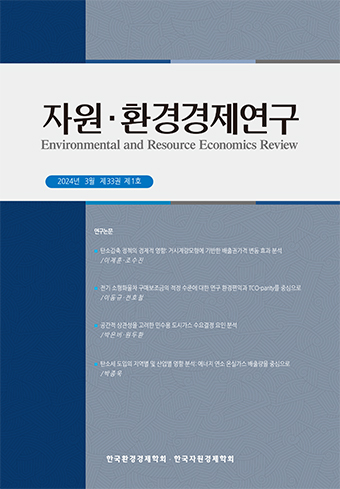Research Paper
Abstract
References
Information
The purpose of this study is to provide basic data for improving energy efficiency by estimating the regional energy efficiency in Korea using the stochastic frontier approach beyond the energy intensity that has been traditionally used as an indicator of energy efficiency. In this paper, energy efficiency and energy intensity efficiency were estimated as a stochastic distance function from 1998 to 2018 for 16 cities and provinces in Korea. In addition, the robustness of energy efficiency according to the capital stock estimation methods which had been mixed in previous studies was reviewed. As a result of the analysis, there is a significant change in regional rankings according to the three energy efficiency indicators, so they should be used complementary to each other. Second, while the energy efficiency improved little by little over time, the energy intensity efficiency decreased slightly though. Lastly, energy efficiency by region according to the capital stock estimation method was not robust. Care must be taken in estimating capital stock, which is important in economic analysis.
본 연구의 목적은 전통적 에너지효율의 지표인 에너지원단위(Energy Intensity)를 넘어 확률적 프런티어 접근으로 우리나라의 지역별 에너지효율성을 추정하고 이를 에너지효율 개선을 위한 기초적 자료로 제공하고자 함이다. 이를 위해 1998‒2018년 기간 동안의 우리나라 16개 시·도의 에너지효율성 및 에너지원단위 효율성을 확률적 거리함수를 활용하여 추정한다. 부가적으로 선행연구에서 혼재하고 있는 자본스톡 추계방법들에 따른 에너지효율성 순위의 강건성을 살펴본다. 분석 결과 첫째, 세 가지 에너지효율의 지표에 따라 지역의 순위에 상당한 변동이 있었으므로 이들을 상호보완적으로 사용해야 할 것이다. 둘째, 에너지효율성은 시간이 지남에 따라 미미하지만 조금씩 개선된 반면, 에너지원단위 효율성은 미미하지만 하락했다. 마지막으로 자본스톡 추계방법에 따른 지역별 에너지효율성은 강건하지 않았다. 경제분석에서 중요한 자본스톡 추정 시 신중을 기해야 할 것이다.
- 강상목, “온실가스 감축에 대비한 에너지 효율의 계측”, 「환경정책연구」, 제11권 제1호, 2012, pp. 75~97.
- 강상목, “확률적 변경 초월대수함수를 이용한 대안적 에너지효율모델 개발과 국제적 비교”, 「환경정책」, 제25권 제3호, 2017, pp. 221~256.
- 강상목, 효율성, 생산성, 성과분석, 법문사, 2015.
- 강상목‧조상규, “광역경제권의 산업성장이전, 인적자본, 생산성성장을 통한 경쟁력 비교”, 「국토계획」, 제48권 제4호, 2013, pp. 253~268.
- 강상목‧조상규, “인적자본과 물적자본의 추정을 통한 지역성장분석”, 「국토연구」, 제68권, 2011, pp. 3~24.
- 구자열‧김수덕, “자료포락분석법을 적용한 한국과 일본의 광역경제권 단위에서 에너지효율성 분석”, 「한국지구시스템공학보회지」, 제48권 제1호, 2011, pp. 79~88.
- 권영성‧김희창, “우리나라 지역경제의 총요소생산성 결정요인 분석-Malmquist 지수와 Barro의 정부지출모형을 이용하여”, 「한국지역경제연구」, 제19권, 2011, pp. 43~67.
- 김미숙, “온실가스 배출제약에 따른 우리나라 시군의 환경효율성 분석”, 「한국지역개발학회지」, 제23권 제2호, 2011, pp. 95~114.
- 김창범, “아시아 지역의 에너지소비 효율성 분석”, 「무역통상학회지」, 제10권 제1호, 2010, pp. 21~32.
- 박승록, 생산성의 경제학, 박영사, 2018.
- 박응석‧김대철, “전력 생산 에너지 비중 구조에 따른 주요 국가별 효율성 비교”, 「산업혁신연구」, 제32권 제1호, 2016, pp. 243~269.
- 박창수‧서윤석, “우리나라 16개 시·도의 제조업부문 총요소 에너지효율성 및 결정요인 분석”, 「지역연구」, 제33권 제1호, 2017, pp. 3~16.
- 박희석, “우리나라 주요 시·도의 총요소생산성 추정”, 「서울도시연구」, 제11권, 제4호, 2010, pp. 1~13.
- 배상훈, “에너지전환, 지자체가 주도··· 지역에너지계획 확정”, Electronic Power Journal. 2020년 5월 13일 승인, 2021년 6월 4일 접속, http://www.epj.co.kr/news/articleView.html?idxno=24872.
- 에너지경제연구원, 2018 지역에너지 통계연보, 2018.
- 이진식, “제조업부문 에너지효율 추이 분석”, 「GRI 연구논총」, 제12권 제3호, 2010, pp. 249~267.
- 임승모‧김명석, “확률변경모형을 이용한 지역별 에너지 효율 측정: 제조업 구조가 에너지 효율성에 미치는 영향을 중심으로”, 「에너지경제연구」, 제16권 제2호, 2017, pp. 89~118.
- 한국은행, OECD 자본스톡 매뉴얼, 서울: 한국은행 경제통계국, 2002.
- Adom, P. K., K. Amakye, K. K. Abrokwa, and C. Quaidoo, “Estimate of Transient and Persistent Energy Efficiency in Africa: A Stochastic Frontier Approach,” Energy Conversion and Management, Vol. 166, 2018, pp. 556~568.10.1016/j.enconman.2018.04.038
- Aigner, D. J., C. K. Lovell, and P. Schmidt, “Formulation and Estimation of Stochastic Frontier Production Function Model Specifications,” Journal of Productivity Analysis, Vol. 7, 1977, pp. 399~415.
- Battese, G. E. and T. J. Coelli, “Frontier Production Functions, Technical Efficiency and Panel Data: with Application to Paddy Farmers in India,” Journal of Productivity Analysis, Vol. 3, 1992, pp. 153~169.10.1007/BF00158774
- Boyd, G. A., and J. X. Pang, “Estimating the Linkage between Energy Efficiency and Productivity,” Energy Policy, Vol. 28, No. 5, 2000, pp. 289~296.10.1016/S0301-4215(00)00016-1
- Boyd, G. A., “Estimating the Distribution of Plant-Level Manufacturing Energy Efficiency With Stochastic Frontier Regression,” Working Paper CES07-07, Duke University, 2007.10.2139/ssrn.1015593
- Coelli, T. J., “A Guide to Frontier Version 4.1 : A Computer Program for Stochastic Frontier Production and Cost Function Estimation,” CEPA Working Paper, Center for Efficiency and Productivity Analysis, University of New England, Armidale, Australia, 1996.
- Farrell, M. J., “The Measurement of Productive Efficiency,” Journal of the Royal Statistical Society: Series A (General), Vol. 120, No. 3, 1957, pp. 253~281.10.2307/2343100
- Honma, S., and J. L. Hu, “A Meta-Stochastic Frontier Analysis for Energy Efficiency of Regions in Japan,” Journal of Economic Structures, Vol. 7, No. 21, 2018.10.1186/s40008-018-0119-x
- IEA, Energy Efficiency 2020, 2020.
- Lv, K., A. Yu, and Y. Bian, “Regional Energy Efficiency and its Determinants in China during 2001–2010: a Slacks-based Measure and Spatial Econometric Analysis,” Journal of Productivity Analysis, Vol. 47, No. 1, 2017, pp. 65~81.10.1007/s11123-016-0490-2
- Lv, W., X. Hong, and K. Fang, “Chinese Regional Energy Efficiency Change and its Determinants Analysis: Malmquist Index and Tobit Model,” Annals of Operations Research, Vol. 228, No. 1, 2015, pp. 9~22.10.1007/s10479-012-1094-5
- Mukherjee, K., “Energy Use Efficiency in the Indian Manufacturing Sector: An Interstate Analysis,” Energy Policy, Vol. 36, No. 2, 2018b, pp. 662~672.10.1016/j.enpol.2007.10.015
- Mukherjee, K., “Energy Use Efficiency in US Manufacturing: A Nonparametric Analysis,” Energy Economics, Vol. 30, No. 1, 2018a, pp. 76~96.10.1016/j.eneco.2006.11.004
- Young, A., “The tyranny of numbers: confronting the statistical realities of the East Asian growth experience,” The Quarterly Journal of Economics, Vol. 110, No. 3, 1995, pp. 641~680.10.2307/2946695
- Yu, J., K. Zhou, and S. Yang, “Regional Heterogeneity of China's Energy Efficiency in ‘New Normal’: A Meta-frontier Super-SBM Analysis,” Energy Policy, Vol. 134, 110941, 2019.10.1016/j.enpol.2019.110941
- Publisher :Environmental and Resource Economics Review
- Publisher(Ko) :자원 · 환경경제연구
- Journal Title :자원·환경경제연구
- Journal Title(Ko) :Environmental and Resource Economics Review
- Volume : 30
- No :4
- Pages :581-605
- DOI :https://doi.org/10.15266/KEREA.2021.30.4.581



 자원·환경경제연구
자원·환경경제연구






